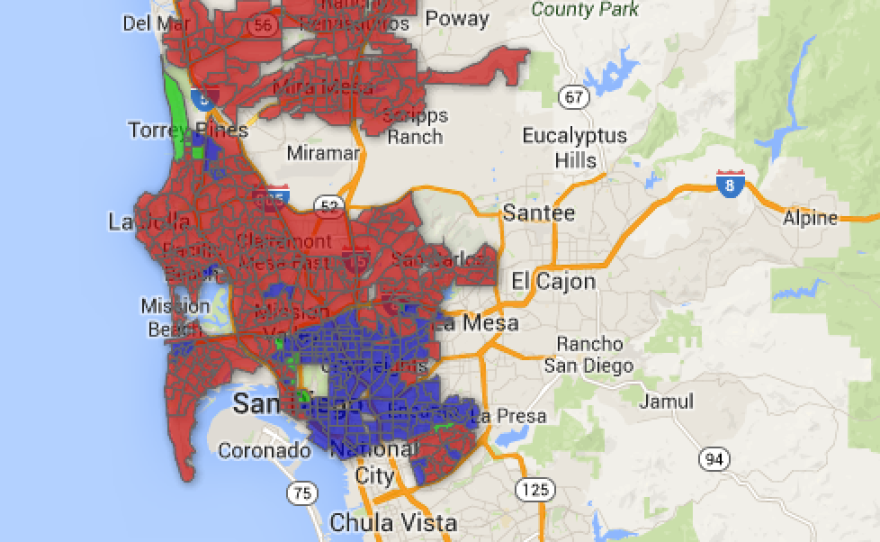Polls released this week and last tell very different tales of just who might be poised to win San Diego’s special mayoral election.
According to a poll done for the Democrats, Councilman David Alvarez is waging a neck-and-neck battle with Republican candidate Kevin Faulconer.
To paraphrase the classic folksy wisdom of the ghost of Dan Rather on election nights past — this poll puts the race closer than Lassie and Timmy.
But that doesn’t jive with the numbers from a poll commissioned by San Diego Republicans. That poll puts the race firmly in Faulconer’s grip, giving the councilman a 13-point lead.
The next poll to come out, a study of Latino voters in the city, gave Alvarez 75 percent of San Diego’s Latino vote.
But just wait, because if you were not confused enough already by this dueling data, a new U-T San Diego/10News poll conducted by SurveyUSA shows Alvarez closing the gap in the general electorate. Alvarez's surge is contributed to a renewed political awakening of his base — voters who reside south of Interstate 8.
Oh Nate Silver, where art thou?
Polls are not the whole picture — they are more like part of the picture, a slice of numbers that leave much open to interpretation. The truth often is buried somewhere beneath the rubble of numbers, and the way pollsters tend to look at them.
Here is what we do know: Registered Democrats outnumber registered Republicans in the city and county. But in special elections, the wisdom is that Republicans will outnumber Democrats at the only poll that matters: the voting booth.
The Democratic poll was conducted by Public Policy Polling — a national polling group that often collects this kind of data for Democrats. While they collect voter data primarily for Democratic races, they have a pretty good track record on crunching the numbers.
According to Vince Vasquez of the National University System Institute For Policy Research, to unpack a poll you have to look at the way it is conducted. Take the Democratic poll, which used robocalls that began with announcing their Democratic party roots.
“That might have skewed the numbers higher for Democratic candidates,” Vasquez said.
Vasquez also said that the Democratic poll oversampled young and Latino voters. He said that "favors a Democratic picture, which is why Alvarez is shown doing so much better.”
Vasquez said he suspects voter turnout could be lower than it was in November, when only 30 percent of San Diegans cast a ballot.
Vasquez acknowledged Election Day is when Democrats shine. Alvarez, he said “was able to get the base, the turnout on Election Day.”
That was enough to hoist him narrowly above onetime front-runner Nathan Fletcher to take on Faulconer in the finals.
And how will a well-organized labor backing help Alvarez?
“I think with the labor council and David, you will see a more effective effort on Election Day,” Vasquez said.
Still Vasquez said the Republican-sponsored poll gave a more accurate account of what actual turnout could look like.
That poll was conducted by the research group Competitive Edge. They also have a good record of polling. Their take on the numbers bolsters the story of a clear lead for Faulconer, rather than a close race.
"For now,” Vasquez said, “Kevin has a really good shot of winning.”
As for the most recent polls showing a growing support for Alvarez among Latino voters and voters that live south of Interstate 8? They aren’t wrong, Vasquez said, but they are based on a less dependable electorate.
“There is something of an X-factor in projecting turnout," Vasquez said. "It is very difficult to get those large numbers to turn out in a special election.”
The take home message of all these dueling polls is simple in the way not knowing is simple. They can only tell us so much, because while they can read their study group of around 500 or so voters, what they fail to predict is who will actually be there, in the booth, casting a ballot. In other words, it still could be either candidate’s race to win — or to lose.







